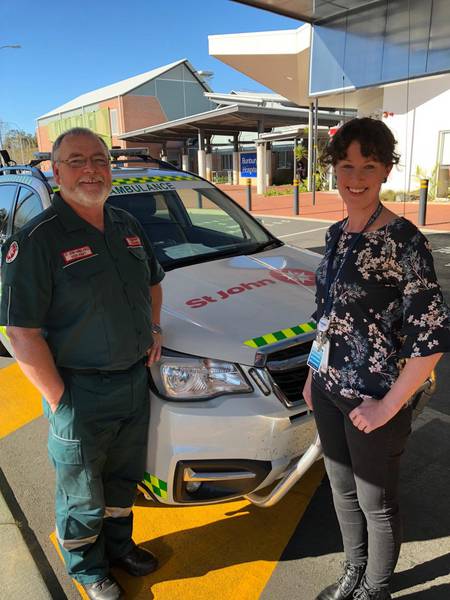Training and partnership saving lives from stroke
 Stroke Week 2018: South West stroke patients are getting faster access to expert care thanks to a partnership between St John Ambulance and WA Country Health. Here SJA Donnybrook Community Paramedic Ken Hart and WACHS South West A/Stroke Coordinator Michaela Eaton discuss the alliance at Bunbury Health Campus.
Stroke Week 2018: South West stroke patients are getting faster access to expert care thanks to a partnership between St John Ambulance and WA Country Health. Here SJA Donnybrook Community Paramedic Ken Hart and WACHS South West A/Stroke Coordinator Michaela Eaton discuss the alliance at Bunbury Health Campus.
South West stroke survivors have been saved from complications thanks, in part, to a partnership between ambulance officers and local hospitals.
St John Ambulance (SJA) officers in the South West have been trained to recognise the symptoms of stroke so that they can call ahead to the Emergency Department (ED) to fast-track life-saving treatment.
WACHS–South West Stroke Coordinators Renee Dehring and Michaela Eaton said every moment counted when it came to reducing the potentially devastating effects of stroke.
“The partnership between WACHS and SJA saves so much time because it allows ED staff to have treatment ready as soon as the patient arrives at the hospital,” Ms Eaton said.
“Ambulance officers can receive direction to bypass smaller hospitals and take the patient directly to a larger hospital with imaging equipment to make a comprehensive stroke diagnosis – which is required to provide time-critical treatment.
“Doctors are then ready to use telehealth to connect with stroke experts in Perth,” she added.
Telehealth sees wireless, portable hospital-grade videoconferencing units in place at Bunbury and Busselton hospitals as part of WACHS’s Acute TeleStroke Project, allowing urgent face-to-face consultation with expert stroke neurologists.
“This faster treatment dramatically increases their chances of survival and recovery,” Ms Dehring said.
The new treatment pathway is available because SJA officers have spent the past year training in quick assessments, including FAST: Facial drooping; Arm weakness; Speech difficulties; and Time to call emergency services.
Since training commenced, the number of suspected stroke patients receiving FAST screening in the South West has increased from around 10 per cent a month to as high as 78 per cent.
SJA Donnybrook Community Paramedic Ken Hart said that ambulance officers were keen to do the training and that several local patients had already avoided severe disability because of SJA’s new upskilling program.
“Through continual training reinforcement and patient record audits it has become clear that the uptake has been nothing short of fantastic,” Mr Hart said.
“On several occasions, Donnybrook crews have been able to identify patients that fit the criteria and appropriately bypassed their local hospital site, transferring the acute stroke patient to Bunbury for definitive imaging and time-critical stroke treatment,” he added
Mr Hat said patients needed to get to an appropriate surgical team within six hours for the clot to be removed.
September 3–9 is National Stroke Week and WA Country Health Service (WACHS) is joining the Stroke Foundation to highlight the work taking place across country WA to reduce the impacts of stroke.
Fact File
- An estimated 700 people in rural WA suffer from a new stroke every year, with regional Australians 19 per cent more likely to suffer a stroke than those living in metropolitan areas.
- WACHS’s landmark WA TeleStroke Project includes the Acute TeleStroke Project which uses videoconferencing and phone calls to speed up access for country patients to expert advice and care from stroke specialists in Perth.
- Telehealth saved WA country patients from travelling 27.3 million kilometres in 2017 – that’s about 12,500 return trips across the Nullarbor, or 35 trips to the moon and back.

